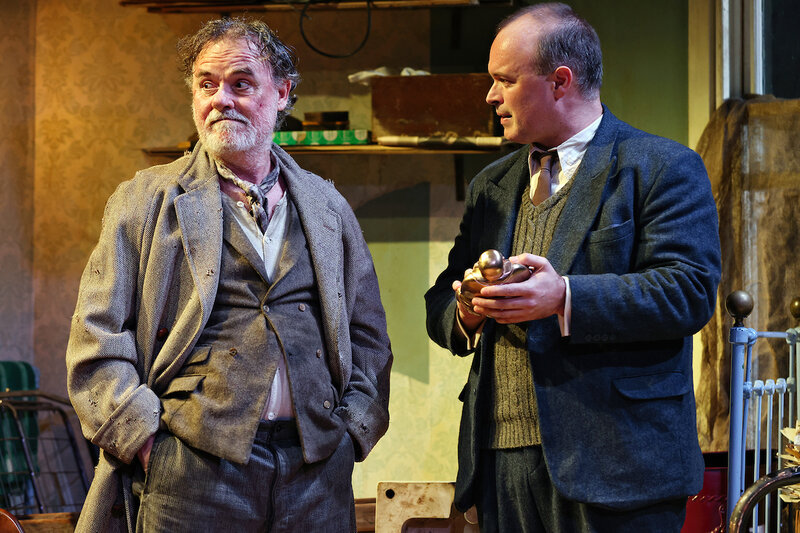There’s no mistaking where The Caretaker is located. As the lights dim, the powerful throng of the bells of Big Ben ring 12 times. Mick, a builder with own van sits solemnly on a single bed in a shabby boarding house in the late 1950s. He is surrounded by meagre furnishings, junk knick-knacks, a gas stove that is not connected and a bucket hanging from the ceiling.
The set is small and raised, with all the hallmarks of a hoarder’s paradise. It feels claustrophobic. Without a word being spoken, the set has become a central character. Harold Pinter’s landmark play is celebrated by director Iain Sinclair. Best described as an absurd comedic drama, I saw flashes of Monty Python-style dialogue. The plot and the communication between characters is, at times, irrational and unreal and yet it is most enjoyable.

The story starts with Aston offering a homeless man called Davies temporary lodgings in his room until he can get back on track. Aston is a simple, well-intentioned character with a good heart. He offers Davies two pairs of shoes, some coins for a meal and a bed to sleep in. Davies is ungrateful and distrusts everyone. He blames society’s ills on immigrants from Europe and Asia, as well as the “bastards in the monastery”. His past is a jumble of lies and deception. He sees the world as against him, but feels he can “right himself” and get work if only he can recover his identity papers from a place called Sidcup. Still, Davies is work-wary and so he always finds a reason not to go. It could be that his shoes are ill-fitting or have no laces, or the weather is no good.
Aston continues to offer friendship by giving Davies a key to the room. The third character is Mick, Aston’s brother. Unaware of Aston’s generosity to Davies, he visits the room the next day, only to find a vagrant (Davies) rummaging through his brother’s belongings. He stalks him like a lion and finally hurls him to the floor to begin an interrogation. Through a barrage of fast and quick-witted questions, Mick highlights the insecurities and lying-nature of Davies. Mick turns the questioning into a game of intellect and shows no mercy by bamboozling Davies with his superior knowledge of finance, banking and decorating.

It is quickly evident that all characters are dysfunctional, lonely and paranoid. Depression is there too to varying degrees. The conversations turn bizarre. Independent of each other, the two brothers offer Davies the role of caretaker for the building. Davies tries to drive a wedge between the brothers.
The attraction of Pinter’s writing is in his ability to create reality out of the strange. You need to listen carefully to the words and consider the context in which they are said. Equally effective is his use of silent moments to deepen the audience’s connection to the characters.
The cast is strong. Darren Gilshenen as Davies, Anthony Gooley as Aston and Henry Nixon as Mick give their all. They provide meaning to the idea that there is a thin line between genius and insanity. Plaudits too to Matt Cox for the lighting, Daryl Wallis for the sound and Veronique Benett for the costumes and set design.

I commend The Caretaker to anyone who appreciates imagery-infused writing, high production values and stimulating entertainment. It is playing at Ensemble Theatre, 78 McDougall Street, Kirribilli until 19th November, 2022.
Paul Kiely
For more of Paul Kiely’s writings on theatre, check out Absolute Theatre
Other reviews you might enjoy:
- The Dumb Waiter (Chapel off Chapel) – theatre review
- Murder on the Wireless (Ensemble) – theatre review
- The One (The Ensemble) – theatre review

Paul Kiely reviews shows in Sydney for www.absolutetheatre.com.au. He joined the team in 2018.





